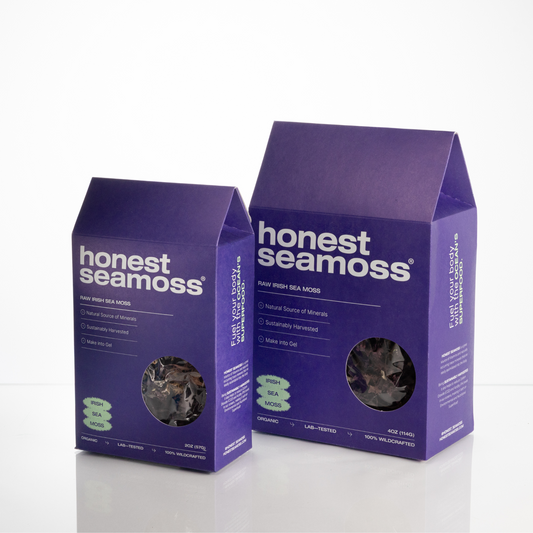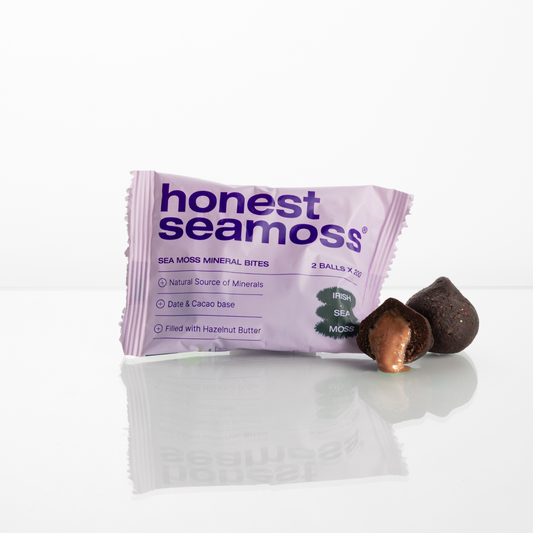Honest Sea Moss for Pregnancy
Honest Sea Moss for Pregnancy
Although pregnant women are advised to be cautious with consuming products from the sea while pregnant, Irish Sea Moss doesn't apply to this category.
While all types of Sea Moss are safe to consume during pregnancy, we have found that Irish Sea Moss (Chondrus Crispus) is the most nutritionally complete and safest to supplement while pregnant. Our Irish Sea Moss is 100% organic and lab-tested, sustainably sourced straight from the coasts of Ireland.
Table of Contents
Types of Sea Moss for pregnancy
 Irish Sea Moss, otherwise known as Chondrus Crispus, is one of the most popular species of Sea Moss. It is a red seaweed that contains lower amounts of iodine and mercury than brown seaweed and are safe to enjoy while pregnant (1).
Irish Sea Moss, otherwise known as Chondrus Crispus, is one of the most popular species of Sea Moss. It is a red seaweed that contains lower amounts of iodine and mercury than brown seaweed and are safe to enjoy while pregnant (1).
Grown underwater, Sea Moss is a great source of iodine. Unlike brown seaweed, which have very high levels of iodine and are not recommended to eat regularly while pregnant, red seaweeds including Irish Sea Moss contain a more moderate amount of this essential nutrient and are safer to enjoy regularly.
Bladderwrack is another popular type of seaweed and usually blended with other types of Sea Moss. Bladderwrack has not yet been evaluated for pregnancy safety therefore should be taken with caution and professional advice.
Benefits of Sea Moss during pregnancy
Sea Moss is a good source of vitamin B12 - important for vegetarian and vegan mothers, as the majority of vitamin B12 containing foods are animal products (2). In addition to B vitamins, Sea Moss also provides necessary minerals including calcium, copper, iodine, iron, magnesium, and zinc (3).
A ¼ cup of Sea Moss provides 6% of your daily iron needs during pregnancy, and the vitamin C content of Sea Moss also helps boost iron absorption (4)!

Grown underwater, Sea Moss is also a good source of iodine. Unlike brown seaweed, which have very high levels of iodine and are not recommended to eat regularly while pregnant, red seaweeds including sea moss contain a more moderate amount of this essential nutrient and are safer to enjoy regularly.
Iodine is essential for all people, but during pregnancy especially. This nutrient is important for maintaining healthy thyroid function and neurological growth and development for babies (5).
Sea Moss may also help to boost your immune system due to its phytonutrients. Darker purple mosses will have the highest levels of anthocyanins, which are compounds in the purple-hued pigment that have been shown to be anti-inflammatory (6).
Though Sea Moss will contain some mercury, like all foods grown in the water, studies have shown that the amount of mercury in seaweeds is less than that of canned tuna fish and well below the safe acceptable limit- including during pregnancy (7)(8).
Sea Moss and Prenatal Vitamins
Folic acid is one of the most talked-about nutrients when it comes to pregnancy. Adequate folic acid is necessary to ensure proper development of your baby’s central nervous system and prevention of neural tube defects.
¼ cup of Sea Moss has an average of 36 micrograms of folate– not folic acid (9). Folate is the naturally occurring form of vitamin B9, while folic acid is the synthetic form.
For this reason, no amount of sea moss is an acceptable replacement for a folic acid-containing prenatal supplement.
While Sea Moss is nutrient-dense and is high in many essential vitamins and minerals that are also found in prenatal supplements, there is no concern for nutrient excesses. It is safe to continue to eat Sea Moss while taking your prenatal supplement.
Taking a quality prenatal vitamin and mineral supplement is recommended for all pregnant women and those trying to conceive, regardless of diet. We believe our Sea Moss gives pregnant women all the nutrients needed for a healthy pregnancy, however we advise that you discuss this with your doctor first.




